Automotive – PEF-resin – rPET 05-09-2022 - Arhive
Automotive – PEF-resin – rPET
Recycled-Polyester- Petrochemicals

Crude Oil Prices Trend
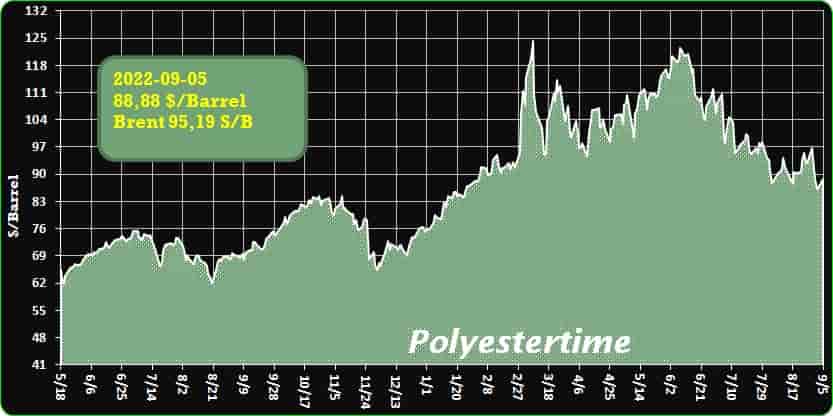
-EU energy chief urges China and India to support a price cap on Russian oil
- China and India have increased their purchases of Russian oil in the wake of Moscow’s invasion of Ukraine, benefiting from discounted rates.
- The price cap is expected to be ready before early December when EU sanctions on seaborne imports of Russian crude kick in.
- But market players are still waiting for further details on the exact level of the cap.
The European Union on Saturday urged China and India to join the G-7 initiative to apply a cap on Russian oil prices, saying it is unfair for countries to pay excess revenues to Moscow amid the Kremlin’s war in Ukraine.
The G-7 nations announced Friday that they agreed on a plan to impose a set price on Russian oil.
The policy is designed to reduce the profits that Russia makes from selling oil and acts as another punitive measure against the Kremlin over its onslaught in Ukraine.
Details of how the price cap will work are still being finalized, but energy analysts have raised concerns about this plan, in particular about whether key consumers such as China and India will join in. Automotive – PEF-resin – rPET
China and India have increased their purchases of Russian oil following Moscow’s invasion of Ukraine, benefiting from discounted rates.
When asked whether the EU expects China and India to help with the proposed price cap, Europe’s Energy Commissioner Kadri Simson said: “I think that they should.”
Speaking to CNBC on the sidelines of the G-20 energy meeting in Indonesia, Simson said China and India “are willing to buy Russian oil products while excusing themselves that this is important for their security of supply. But it is unfair to pay excess revenues to Russia.”
“So a cap is giving also the buyers who have not joined our sanctions a chance to receive oil with a fair price, a price where a war factor is not added,” Simson said.
The U.S. said last week that it had constructive talks with India on the matter, according to Reuters, while China reportedly said in July that a price cap was a “very complicated issue.”
‘Huge time pressure’
The price cap is expected to be ready before early December when EU sanctions on seaborne imports of Russian crude kick in. But market players are still waiting for further details on the exact level of the cap.
“The initial price cap will be set at a level based on a range of technical inputs and will be decided by the full coalition in advance of implementation in each jurisdiction. The price cap will be publicly communicated in a clear and transparent manner,” the G-7 said in a joint statement. Automotive – PEF-resin – rPET
The EU’s energy policy chief did not say when the final details will be presented but added that technical work is ongoing. “We are under huge time pressure,” she said, adding that this typically means such steps happen “sooner rather than later.”
Russia has said it will not sell oil to nations that impose a price limit. What’s more, in the wake of the G-7 announcement, Russia’s state-owned energy giant Gazprom said it would not restart flows via the Nord Stream 1 pipeline due to technical issues.
The Nord Stream 1 pipeline, which connects Russia and Germany via the Baltic Sea, was due to reopen on Saturday after three days of technical works.
-Sulzer acquires stake in CELLiCON to scale up renewable biopolymer technology
Fluid engineering specialist Sulzer has partnered with bio-based materials producer CELLiCON to scale up its manufacturing technology for nano structured cellulose – a highly sustainable, plant-based alternative to conventional polymers.
The company said the technology slashes the high costs and environmental footprint associated with nanocellulose, allowing it to be scaled and used as a building block for a wide variety of everyday products, from textiles to glues.
Sulzer added the partnership is part of its strategy to continue its growth in renewables – it has acquired a minority stake in CELLiCON with an option to increase its holding in future.
Cellulose is the most abundant biopolymer on the planet, and it is obtained from renewable plant-based resources. Automotive – PEF-resin – rPET
Its crystalline form, also known as nanocrystalline structured cellulose (nanocellulose), is considered one of the most promising alternatives to conventional polymers which are derived from petroleum oil. The partnership will boost the scale up and commercialisation of nanocellulose as a sustainable alternative.
Nano structured cellulose is a building block for a variety of materials and products such as textiles and high-performance fibres, composities like superglues and coatings, transparent films, and replacements for starch and polystyrene.
CELLiCON has developed groundbreaking technology, known as G2 technology, that strongly reduces the costs, cycle times and environmental footprint associated with the production of nanocellulose, thereby enabling the large-scale adoption of this highly sustainable biopolymer.
Sulzer said it will support CELLiCON in the scale-up and commercialisation of the G2 technology.
It added the collaboration will help CELLiCON achieve its strategic goals and long-term vision while strengthening Sulzer Chemtech’s portfolio of processing technologies for bio-based and renewable feedstocks.
In particular, the solution can be used to further enhance the properties of polylactic acid (PLA), the most used bioplastic worldwide for which Sulzer is the global leader.
![]()
-Recycled PET Market to Exceed Value of US$ 11.9 Bn by 2031: TMR Study
Transparency Market Research Inc. – Growing demand for recycled PET (RPET) in the manufacture of fibers and food-grade resins has spurred R&D in PET monomer recycling processes. Increasing commercialization of cutting-edge technologies has helped utilized various types of PET waste materials in various applications, thus extending the canvas for players in recycled PET market. The size of the market is projected to expand at CAGR of 7% during forecast period of 2021-2031. Automotive – PEF-resin – rPET
Plastic collection have witnessed a slowdown in recent years due to variability in demands especially synthetic fabrics made of recycled PET. Moreover, there is growing concern of microplastics shedding from these fabrics. On the other hand, the adoption of novel recycling processes has boosted the outlook of recycled PET market. Key players are leveraging the technology for increasing the market share for recycled PET.
Advances in infrastructure for PET bottles recycling has bolstered the revenue prospects in the recycled PET market. Especially in Europe, tons of PET bottles have been collected and recycled. Other developing and developed nations have also ramped up investments in strengthening the infrastructure, which will lead to expansion of the recycled PET market.
Massive Use in Fiber Application to Generate Sizable Profit Streams: Rising application of recycled PET in various types of fibers has propelled revenue growth for market players. The fiber segment held a key share of the global market and is anticipated to gain market share by the end of the forecast period. Fibers made from RPET exhibit several attractive properties, such as offering remarkable protection against moisture and microorganisms.
Rising Demand for PET Bottles to Enrich Market Prospects: Firms are keen on tapping into the vast revenue streams by offering RPET for bottles. F&B brands are keenly producing recyclable PET bottles, which has spurred the sales of recycled PET market. Stridently, 100% RPET bottles have unlocked a vast value-grab opportunity for players in the recycled PET market. The demand for these will help post-resin manufacturers and producers to gain market share for recycled PET market. Thus, commercialization of RPET for food trays and bottles will augment the market value of recycled PET.
Packaging Solutions Based on Post-Consumer Resins Create Vast Revenue Potential: Rise in preference of post-consumer resins recycled PET presents a vast lucrative avenue for industry players in recycled PET market. Automotive – PEF-resin – rPET
The segment held a major share in 2020, and is anticipated to gain shares by the end of the forecast period. Mounting concerns of adverse ecological impacts of plastics pollutions has invigorate consumer demand in the segment.
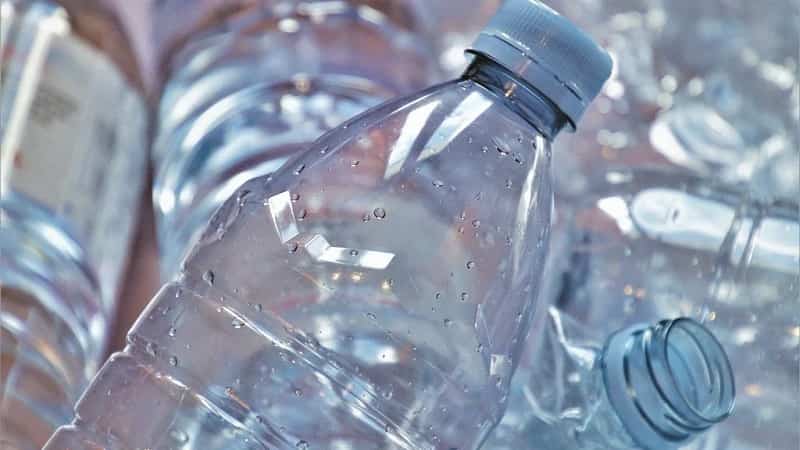
-Superior cotton protection with DuraTech
Non-heavy metal antimicrobial is binder-free, non-ionic and fully water soluble.
DuraTech by Microban International is a new antimicrobial additive with superior wash durability designed specifically for cotton applications.
The technology helps to prevent the growth of odour-causing bacteria by up to 99.99% after 75 home launderings, which far exceeds industry standards.
DuraTech addresses the needs of brands and manufacturers for a more durable and sustainable solution through the elimination of heavy metals from the formulation. As well as being a non-heavy metal antimicrobial, it is also binder-free, non-ionic and fully water soluble. These features allow DuraTech to easily integrate into cotton fabrics during normal padding manufacturing processes, with no impact on the appearance or feel of the final cotton product. DuraTech works continuously to protect cotton products from the growth of harmful bacteria, which can lead to unpleasant odours, stains and early product deterioration. Automotive – PEF-resin – rPET
The product will be available to cotton fabric manufacturers and brands in the USA and Asia with turnkey support services for branded partners making antimicrobial cotton products such as sheets and towels for home textiles, hospitality, apparel and more.
“This technology is specifically targeted at cotton substrates and delivers unparalleled antimicrobial product protection and wash durability without relying on the use of heavy metals,” said Michael Ruby, president of Microban International.
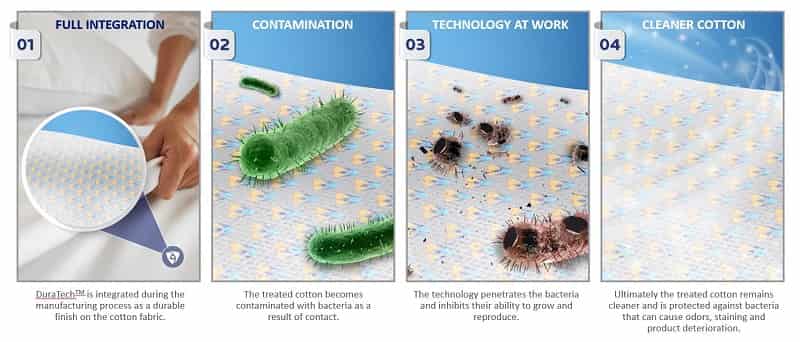
-BOPET Films on the problems with household flexibles circularity
In this edition of our ‘In Conversation With…’ feature, BOPET Films Europe’s chairman, Steven Davies, discusses the problems with circularity in household flexible packaging, the role that PET currently plays in these applications, and the future of these trends.
You’re of the belief that household flexible packaging has a problem when it comes to circularity. To start us off, could you give us a broad outline of this?
The first point to make is how resource-efficient flexible packaging structures are and we shouldn’t lose sight of the positive role flexible packaging plays throughout its product life cycle, but unfortunately it is true that there are still challenges to address with circularity at the end of life. Automotive – PEF-resin – rPET
The resource efficiency of household flexible packaging relies on a complex mix of materials, inks and adhesives, and when added to the fact that the pack sizes are small and can have a high level of food residue it essentially rules out mechanical recycling as a viable, economic end of life strategy regardless of the mix of plastics used.
I think it is important to assess product sustainability throughout the lifecycle of a product taking into account the impact of production, the performance in use and then the potential end-of-life outcomes.
PET is currently the backbone of about 25% of all household flexible packaging structures, and replacing this with a polyolefin alternative will lead to a significant increase in the use of plastic to get the same level of pack performance. If you consider a property like pack stiffness, you require up to a 60% increase in thickness to get the same performance from a PE film compared to PET.
Another very important factor is that if you design out PET, you lose the ability to incorporate recycled content into food contact applications which of course is the opposite of one of key four pledges in the European plastics pact.
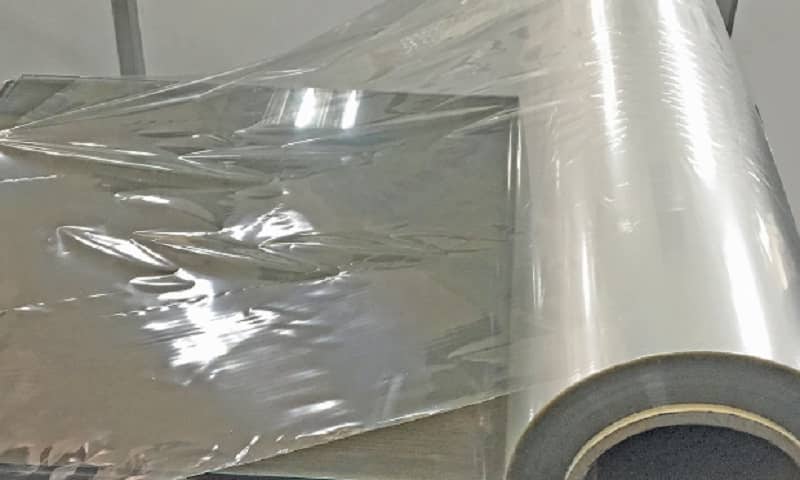
-Eurozone, UK under ‘recessionary conditions’ as winter storm gathers pace
Economic indicators in the eurozone and the UK are worsening as domestic and overseas demand is weakening, suggestive of “recessionary conditions” for the months ahead, an economist at ICIS said on Thursday.
Kevin Swift, senior economist for global chemicals at ICIS, said the European manufacturing sectors are facing several headwinds in coming months as energy costs rise while supply chain woes and shortages of labour remain.
Earlier on Thursday, the PMI manufacturing indices for the eurozone and the UK showed they contracted in August. Automotive – PEF-resin – rPET
In Asia, China’s manufacturing PMI also showed a contraction for August, while Japan’s expanded.
A positive in both the 19-country eurozone and the UK in August was an easing of input costs for manufacturers, as well as a slowdown in selling prices.
However, they remain at multi-decade highs.
“[In the UK] Production suffered its steepest contraction since May 2020. Input costs and selling price inflation eased further, but is still elevated … [In the eurozone there is] Weak demand as inflation erodes purchasing power and weakened demand overseas,” said Swift.
“Headwinds to European manufacturing are many as the sector struggles under the weight of rising energy costs, supply chain bottlenecks, and shortages of labour. That both the UK and the eurozone are negative are suggestive of recessionary conditions.”
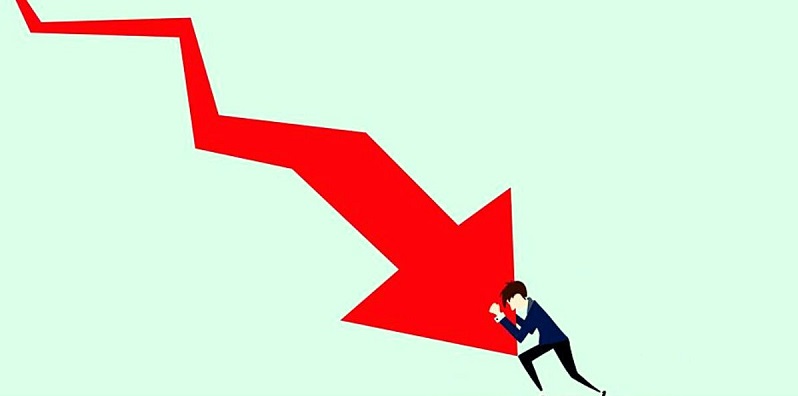
The war in Ukraine first caused oil price volatility, which increased as surging COVID-19 cases in China led to fresh lockdowns, hitting demand and disrupting supply chains. China is the world’s second biggest economy and largest oil importer.
Now Russia’s decision to reduce flows of natural gas to Europe means the continent has to look forward to a winter of potential rationing, which could hit chemical production. Tightened supply has also sent gas prices soaring, with high costs forcing production cuts, especially in fertilizers.
India is facing a more severe shortage of fertilizers and edible oil amid wide-ranging trade disruptions as the Ukraine war rages on, with financial sanctions tightening on Russia.
Europe’s energy challenge is immense and put into stark relief by the response to Russia’s war in Ukraine. Cutting the ties that bind EU and non-EU nations to Russian gas and oil will be extremely painful this year and in years to come.
This topic page examines the impact of the Ukraine conflict on oil, gas, fertilizer and chemical markets. Automotive – PEF-resin – rPET
Europe’s energy markets witnessed a year of record prices and extreme volatility in 2021. Russia’s invasion of Ukraine has led to more difficult conditions for global markets in 2022.
GAS SUMMARY
- Gas storage over 70% in Europe, winter demand will be 30% higher than rest of year
- Record shipments of liquefied natural gas (LNG) to Europe so far in 2022
- LNG plus Norwegian, Algerian, Azerbaijani pipeline imports compensate for Russian supply shortfall
- Europe LNG processing operating at full capacity
- Russia resumed flows through Nord Stream I pipeline at low levels, but halted again for maintenance
- EU plan calls for voluntary 15% cut to consumption, industry may face much tougher reductions

Certification granted by AENOR, a top ten global body for management systems and product certification. Automotive – PEF-resin – rPET
Dow announced recently its post-consumer recycled-rich resins, REVOLOOP™, are the first polyethylene (PE) compounds to be certified in accordance with the Standard UNE-EN 15343 for plastics recycling traceability and recycled content. The certification has been granted by AENOR, a global company and the Spanish leader in conformity assessment and extends to all three grades offered by Dow in Europe.
Stop the waste, close the loop
REVOLOOP™ grades are part of Dow’s plastics circularity portfolio and incorporate a high percentage of post-consumer recycled (PCR) material.
The single-pellet solution enables a simpler PCR process integration, meeting the needs of converters, brand owners and sustainable packaging designers, and can be used in a broad range of applications. Providing access to quality, consistent waste streams, and increasing reliability in the waste value chain, the REVOLOOP™ family of PCR-rich resins expand Dow’s sustainable offerings portfolio to help advance a closed loop system for plastic waste.
“REVOLOOP™ represents a tangible step towards realizing our vision for a circular plastics economy,” said Peter Sandkuehler, European Sustainability Director for P&SP. “It exemplifies Dow’s efforts around the world to enable mechanical recycling and the incorporation of PCR in a variety of technologically demanding applications. Such progress will bring all the players in the value chain further in their sustainability journey.”
Certified sustainable production
The UNE-EN 15343 is the European Standard that specifies the procedures needed for the traceability of recycled plastics and covers two schemes: the traceability and characterization in the plastic recycling process, and the minimum content of post-consumer recycled plastic used in the processing of a plastic product.
This certification was awarded following a full independent, external audit to ensure that the control of incoming plastics waste, the traceability in the production processes of recycled material and the percentage of post-consumer recycled material included in the certified products, Dow XZ98612.00 (30%), Dow XZ98615.00 and Dow XZ89169.00 (70%), complies with the requirements set out in UNE-EN 15343 standard.
Therefore, AENOR has verified that the manufacture of Dow’s polyethylene compounds contains up to 70% of post-consumer recycled products, which have either fulfilled their intended purpose or can no longer be used for the purpose for which they were conceived.
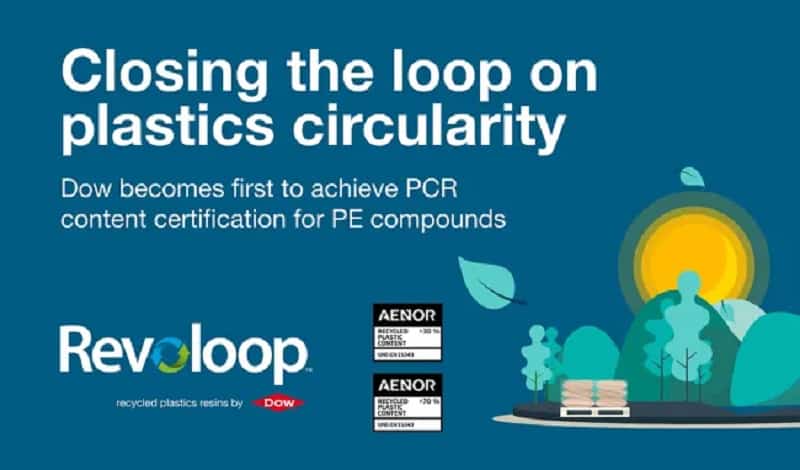
Automotive – PEF-resin – rPET
